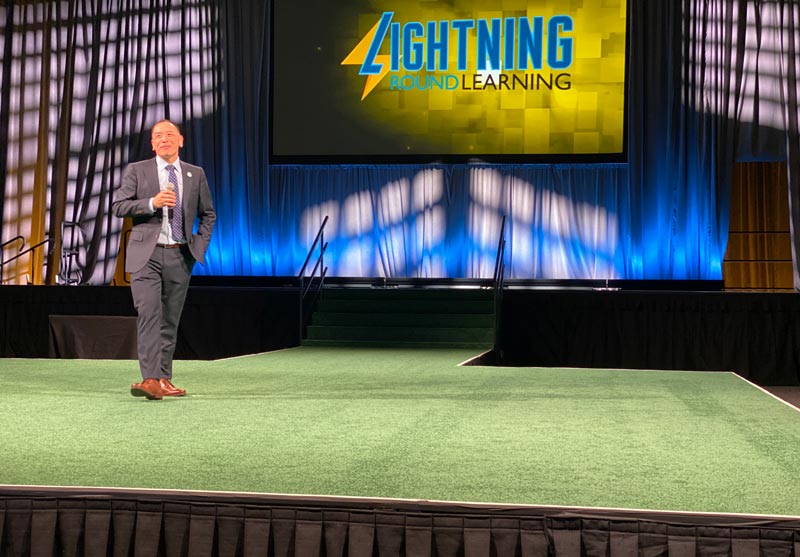
Frank Wong, Ph.D., moderated the free “Lightning Round Learning!” education session at the 2020 Golf Industry Show in Orlando, Fla. Photo by Roger Billings
They came with bright ideas. Advice. Suggestions. Pleas.
Thirteen speakers took five minutes apiece Tuesday at the 2020 Golf Industry Show to present entertaining and enlightening insights and personal experiences to assist those in the turf industry with their jobs and, possibly, change lives. This was the fourth edition of Lightning Round Learning! at the Golf Industry Show, which was hosted by Frank Wong, Ph.D., senior regulatory affairs consultant for Bayer.
What follows is each speaker’s topic and, in most instances, a nugget of wisdom.
• Jodie Cunningham, owner of Optimus Talent Partners, spoke about the ability to delegate. The key? Clarifying and explaining — not micromanaging — goes a long way. “If you can’t delegate, your club suffers.”
• Eric Duncanson, equipment manager at Pine Needles and Mid Pines Golf Resorts in Southern Pines, N.C., discussed hosting major championships. What makes an event of this magnitude successful? “Even the boss works.”
• Paul MacCormack, superintendent at Fox Meadow Golf Course on Prince Edward Island in Canada: How do you maintain great surfaces? It’s all about the turf’s health — and your health too. “When’s the last time you evaluated your own well-being? Our well-being is integral to the well-being of our maintenance program. Maybe 2020 is the time to give it the attention it deserves.”
• John Dempsey, Ph.D., an independent turfgrass researcher based in Ireland, told of his determination to conquer pink snow mold, which has been presenting challenges for years.
• Frank Rossi, Ph.D., of Cornell University asked, “What happens when you don’t ... ?” “Not doing something can save money and protect the environment.”
• Lori Hoffner, a suicide intervention specialist, told attendees, “Talking to someone about suicide reduces risk. Ask the question about suicide, and know resources are available to help someone you care about.”
• Delphine Tseng, president and founder of Landseer Communications and Consulting, urged attendees to share their stories, even with those who may be convinced golf courses negatively impact the environment. “Go out and tell your story about healthy water, pollinators, how you can show your neighbors how to water their yards, and let them know, ‘Hey, we’re on the same page.’”
• Nick Christians, Ph.D., of Iowa State University on calcium: Do you need it or not? “If you have enough at your facility, you simply don’t need to add any more to the course, so save your money.”
• Matt Gourlay, CGCS, MG, of Colbert Hills Golf Course in Manhattan, Kan., said the recent major wildfires in the United Sates and Australia have thrust attention on how to slow or stop such devastation. “Create firebreaks on the golf course. Concrete is a firebreak. So is a pond. Streams are natural firebreaks.”
• Greg Brandriet, CGCS, of Elkhorn Ridge Golf Club in Spearfish, S.D., witnessed his course’s pond vanish. His team rebuilt the entire pond, overcoming a rain-free month in summer 2012 that tested the facility’s mettle. By September, the pond had been restored. He quoted Albert Einstein to put what happened in perspective. “In the midst of every crisis, lies great opportunity.”
• Jay McCurdy, Ph.D., of Mississippi State University, on what he called “Generation $$$” and hiring millennials: “Be honest when you recruit. It (this industry) can be challenging, but rewarding and fun.”
• Kevin Sunderman, CGCS, of Isla Del Sol Yacht & Country Club in St. Petersburg, Fla., offered a tip on lake bank erosion. He used Geotube for stabilization and long-lasting and natural-looking results.
• Wong wrapped up the session, and his usual upbeat disposition was right in step with his parting shots: “Be flexible. Accept challenges. Surround yourself with positivity. Have fun. If you see me with a goofy smile, it’s because I get to work with you all, the best industry in the world.”
Howard Richman is GCM’s associate editor.